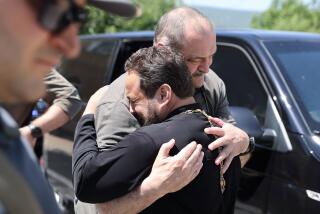Iraq attacks raise new concerns about U.S. pullout
- Share via
Reporting from Cairo and Baghdad — A series of blasts and gunshots ripped across Iraq on Monday, killing at least 70 people and wounding more than 300 in a spasm of bloodshed that raised fresh concerns that the nation’s security forces might be overwhelmed by insurgents when American soldiers withdraw later this year.
The sprawling attacks, including suicide bombers, car explosions and militants firing Kalashnikov rifles, struck from north to south throughout the morning in what appeared to be a coordinated plan. Soldiers, police officers and market shoppers were targeted in Najaf, Kut, Baghdad, Baqubah and other areas.
The violence made for one of the most vicious days in Iraq in months and erupted in the middle of the Islamic holy month of Ramadan. The country shook with explosions as families gathered their dead and Iraqis stood shaking their heads beside craters and charred cars in attacks reminiscent of the fighting between Shiite and Sunni Muslims four years ago.
It appeared Iraq was in a time warp, a nation still struggling with terrorists, sectarian gangs and militias at a time much of the Arab world is moving to replace extremism through revolutions for democracy. The violence seemed intent on disrupting the government of Prime Minister Nouri Maliki as U.S. forces are preparing to leave eight years after the fall of Saddam Hussein.
There were more than 35 attacks nationwide, shattering the relative calm of recent months. The deadliest was in the southern city of Kut, where an explosion whirled through a marketplace. Minutes later, as onlookers gathered, a car bomb detonated, killing at least 33 people and injuring 77, according to a security official.
Ali Haidari, a security expert, said the assaults came shortly after Abu Mohammed Adnani was named Al Qaeda’s new leader in Iraq. Haidari said the terrorist group had been announcing for weeks on its website that it was preparing a major operation to exploit the perceived weakness of Iraqi forces.
“These attacks were expected,” he said. “But despite this I still think American troops should leave Iraq so that confidence will not be lost between Iraq, America and the international community.”
The violence was relentless, befalling Shiite and Sunni alike. In Diyala province, a series of car bombings and shootings left 14 people dead in a region known for Al Qaeda fighters. In Najaf, a suicide bomber detonated and five minutes later a parked car exploded near a police building, killing two police officers and four civilians. Five security officers and a counter-terrorism chief were killed in suicide bombings in Tikrit.
Gunfire and explosions echoed through Baghdad, the capital. A car bomb exploded near a motorcade carrying an official from the Higher Education Ministry, killing one passerby and wounding seven police officers and civilians. Al Arabiya television reported that a curfew had been imposed on several regions.
“There are countries and outside agendas that want to spread their crises to Iraq,” Salman Jumaili, chief of the Iraqiya political bloc, told parliament. “We must pay attention to this.”
The blame is “on the American troops,” said Ali Sabih, owner of a food shop in Baghdad. “Iraqi troops are weak and they’ll need more years before they’re ready to protect the country.”
The attacks came as the Iraqi government has said it would negotiate with Washington about retaining some of the nearly 50,000 U.S. troops in the country after a planned U.S. withdrawal this year.
“The violence was for propaganda, not strategy,” said Jumaa Khalaf, a political analyst. “Terrorism is no longer capable of controlling the country.… What happened today is senseless. It has no message to the Iraqi people or their political powers. Terrorism has been disavowed from Iraqi conscience and memory.”
Fleishman reported from Cairo and special correspondent Salman from Baghdad.
More to Read
Sign up for Essential California
The most important California stories and recommendations in your inbox every morning.
You may occasionally receive promotional content from the Los Angeles Times.











